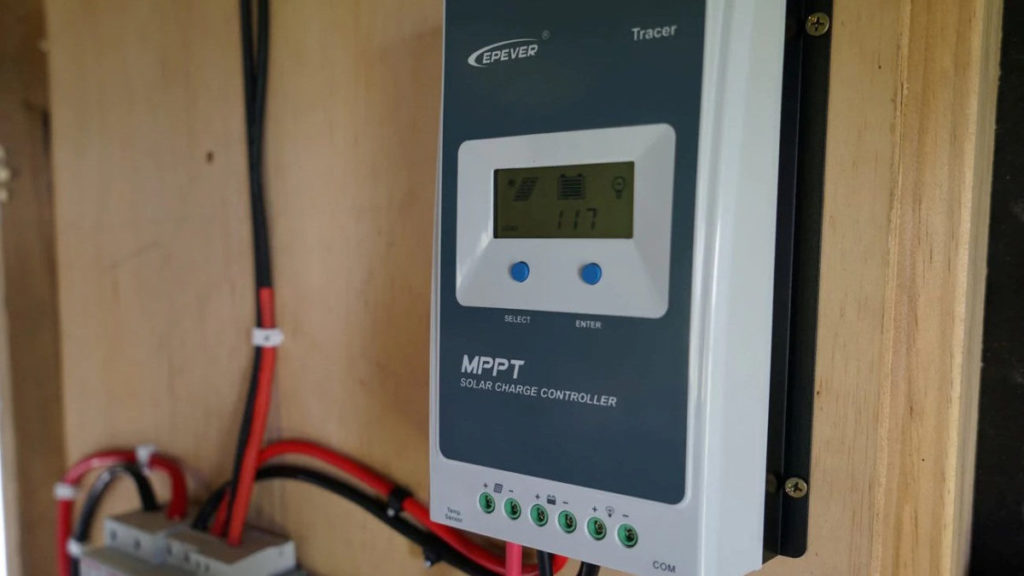Determining when to replace your charge controller can be a important decision for ensuring optimal performance and longevity of your off-grid system.
A malfunctioning or outdated charge controller can cause a range of issues, from inconsistent battery charging to reduced energy efficiency.
To avoid these problems and maintain the reliability of your renewable energy system, it’s essential to understand the signs that indicate it’s time for a new charge controller.
This post will explore those indicators and guide you through the process of selecting the right replacement component to ensure continued off-grid success.
Age
If your charge controller is more than 5-7 years old, it may be nearing the end of its lifespan. Technology advancements have improved efficiency, reliability, and feature sets, so it may be time for an upgrade.
If your charge controller is more than 5-7 years old, it may be nearing the end of its lifespan.
As technology advances, charge controllers have evolved to become more efficient, reliable, and feature-rich, making it an ideal time for an upgrade.
New charge controllers often boast improved efficiency, thanks to advancements in materials and design.
This means that your system can now produce more power from the same amount of sunlight, resulting in higher energy yields and increased savings on your electricity bill.
Furthermore, newer charge controllers typically feature enhanced reliability, ensuring that your system remains operational for longer periods, even in harsh environmental conditions.
Moreover, modern charge controllers often come equipped with advanced features such as automatic temperature compensation, load balancing, and remote monitoring capabilities.
These features can help you optimize your system’s performance, ensure maximum energy production, and detect potential issues before they become major problems.
In short, upgrading your charge controller can bring numerous benefits to your solar energy system, including increased efficiency, improved reliability, and advanced features that can help you optimize your system’s performance.
So, if your charge controller is more than 5-7 years old, it may be time to consider an upgrade to take advantage of the latest advancements in solar technology.
Performance Issues
If you notice inconsistent or poor charging and maintenance of your batteries, it may be due to a worn-out or malfunctioning charge controller. Check for signs of faulty or outdated firmware, loose connections, or worn-out components.
If you’re experiencing inconsistent or poor charging and maintenance of your batteries, it’s essential to check for signs of a malfunctioning charge controller.
A worn-out or outdated charge controller can cause a range of performance issues, including poor battery maintenance and inconsistent charging.
Look for signs of faulty or outdated firmware, loose connections, or worn-out components.
First, check the charge controller’s firmware to ensure it is up to date.
Outdated firmware can cause compatibility issues with other components and result in poor performance.
If the firmware is outdated, update it to the latest version.
Next, inspect the charge controller’s connections to ensure they are secure and not loose.
Loose connections can cause the charge controller to malfunction and result in poor battery maintenance.
If you find any loose connections, tighten them to ensure a secure connection.
Check the charge controller’s components for wear and tear.
Over time, components can wear out and cause performance issues.
If you find any worn-out components, replace them with new ones to ensure optimal performance.
By checking for signs of a malfunctioning charge controller, you can identify and address any performance issues before they become more serious problems.
This can help you maintain healthy batteries, ensure consistent charging, and prevent more costly repairs down the line.
Incompatibility with New Components
If you’re upgrading other components in your system, such as a new solar panel or battery, it’s essential to ensure that your charge controller is compatible with the new components.
Upgrading other components in your off-grid solar power system, such as a new solar panel or battery, can be an exciting way to improve your system’s performance and longevity.
However, it’s essential to ensure that your charge controller is compatible with the new components to avoid any potential issues or inefficiencies.
For example, if your new solar panel has a higher voltage or current rating than your existing charge controller can handle, it may not be able to charge your battery properly, leading to reduced performance and potentially shorter battery life.
Similarly, if your new battery has a different chemistry or voltage rating than your existing charge controller is designed for, it may not be able to charge or maintain the battery properly, leading to similar issues.
Therefore, before upgrading any components in your system, it’s important to research and verify the compatibility of your charge controller with the new components to ensure seamless integration and optimal performance.
Lack of Features
If your current charge controller lacks advanced features like smart charging, overvoltage protection, or remote monitoring, it may be time to consider a newer model with more functionality.
Upgrading to a modern charge controller with advanced features such as smart charging, overvoltage protection, and remote monitoring can provide significant benefits for your solar power system.
Smart charging capabilities can help to optimize your battery’s performance and longevity by tailoring the charging schedule to your specific battery needs.
Overvoltage protection ensures that your battery is safe from damage due to excessive voltage, while remote monitoring allows you to keep tabs on your system from anywhere, providing peace of mind and the ability to address any issues promptly.
By investing in a more feature-rich charge controller, you can unlock these advantages and ensure that your solar power system operates at its full potential.
Outdated Software
Check if your charge controller has outdated software that is no longer supported by the manufacturer. This can lead to compatibility issues and potential security risks.
Outdated software in charge controllers can lead to compatibility issues and potential security risks.
If the software is no longer supported by the manufacturer, it may not be optimized for the latest hardware components or operating systems, which can result in reduced performance, increased power consumption, and a higher likelihood of system failures.
Furthermore, outdated software can leave your charge controller vulnerable to security threats, such as malware or cyber attacks, which can compromise the integrity of your system and potentially cause data breaches or financial losses.
Therefore, it is essential to ensure that your charge controller software is up-to-date and supported by the manufacturer to avoid these risks and maintain a secure and reliable energy storage system.
Increased Energy Consumption
If your charge controller is unable to optimize charging and maintain battery health, you may be experiencing increased energy consumption. This could be due to worn-out components or a malfunctioning charge controller.
If your charge controller is unable to optimize charging and maintain battery health, you may be experiencing increased energy consumption.
This could be due to worn-out components or a malfunctioning charge controller.
The charge controller is responsible for regulating the flow of energy between the solar panels and the battery bank, and if it is not functioning properly, it can cause the solar panel system to draw more power than necessary.
This can lead to higher energy bills and reduced battery performance.
In addition, a malfunctioning charge controller can cause the battery to degrade more quickly, reducing its lifespan and overall system efficiency.
To address this issue, it is important to regularly inspect and maintain the charge controller and other components of the solar panel system to ensure optimal performance and extend the lifespan of the system.
If you suspect that your charge controller is not functioning properly, it is recommended to consult a professional solar panel technician for proper diagnosis and repair.
Repair vs. Replace
If your charge controller is repairable, you may choose to repair it. However, if the cost of repair outweighs the cost of a new charge controller, it may be more cost-effective to replace it.
When it comes to dealing with a faulty charge controller, you have two main options: repairing the existing unit or replacing it with a new one.
If your charge controller is repairable, it can be a cost-effective solution to fix it rather than purchasing a brand-new unit.
However, if the cost of repair outweighs the cost of a new charge controller, it may be more cost-effective to replace it entirely.
In order to determine whether repairing or replacing your charge controller is the best option for you, consider the age and condition of the unit, as well as the cost of the necessary repairs.
If the charge controller is relatively new and the issue is minor, repairing it may be a better option.
However, if the unit is older or the problem is more extensive, it may be more cost-effective to replace it altogether.
Consider the warranty and support options available from the manufacturer.
If the unit is still under warranty, repairing it may be a better option.
However, if the warranty has expired or the manufacturer no longer provides support for the unit, replacing it with a new charge controller may be a more viable solution.
Ultimately, carefully weighing the costs and benefits of each option can help you determine the best course of action for your specific situation.
New Technology Advantages
New charge controllers often incorporate the latest technology advancements like intelligent Maximum Power Point Tracking (MPPT), efficient energy harvesting, and improved temperature management. Upgrading to a new charge controller can lead to improved system performance and energy efficiency.
New charge controllers boast the latest technological advancements that can significantly enhance the performance and efficiency of PV systems.
These advancements include Intelligent Maximum Power Point Tracking (MPPT), which ensures that the charge controller is able to extract the maximum power from the solar panels.
This results in higher energy yields and reduced energy loss, thereby increasing the overall efficiency of the system.
New charge controllers often incorporate advanced temperature management techniques, which help to prevent overheating and ensure the longevity of the system.
Upgrading to a new charge controller can provide numerous benefits, including improved energy harvesting, reduced energy loss, and increased system efficiency.
By upgrading to a modern charge controller, PV system owners can ensure that their system is running at its full potential, and enjoy the many advantages of renewable energy.
Want More? Dive Deeper Here!
Hey there! If you’re the type who loves going down the rabbit hole of information (like we do), you’re in the right spot. We’ve pulled together some cool reads and resources that dive a bit deeper into the stuff we chat about on our site. Whether you’re just killing time or super into the topic, these picks might just be what you’re looking for. Happy reading!






